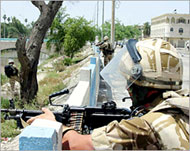UK Iraq intelligence ‘seriously flawed’
Prime Minister Tony Blair has been cleared of responsibility for holes in his case for war in Iraq, while Britain’s secret services are facing fresh embarrassment.

Five days after a Senate committee lambasted US intelligence services for exaggerating the threat of Iraqi weapons, Lord Butler’s report subjected British spy agencies to similarly tough scrutiny on Wednesday.
The Butler inquiry blasted the state of pre-war intelligence on Iraq’s weapons of mass destruction but cleared Prime Minister Tony Blair of responsibility for the failings.
The 196-page report, seen as crucial to the future of Blair’s premiership, contained some serious rebuffs, notably its conclusion that Iraq almost certainly did not possess significant stocks of WMDs before the conflict.
“This inquiry,” Jane’s intelligence thinktank said earlier, “will be about failure… Intelligence assessments prepared before the Iraq invasion were so wrong that no amount of political manoeuvring can cover the credibility gap.”
Blair was not responsible for failures of British intelligence on Iraq’s weapons of mass destruction ahead of the war to oust Saddam Hussein, the inquiry reported.
Britain’s pre-war intelligence placed undue weight on Iraq’s pre-war intelligence, it said, and also contained many serious flaws.
Weak intelligence
Lord Butler’s report, five months in the making, said that Baghdad “did not have significant, if any, stocks of chemical or biological weapons in a state fit for deployment or developed plans for using them.”
 |
|
UK intelligence of Iraq’s |
Much of the British intelligence on Iraq’s weapons of mass destruction used to justify the war against Saddam, was likely to have been unreliable, the report said.
Butler criticised both shaky intelligence and the way political aides massaged raw data for public consumption but he refused to name any individual or group specifically.
The report found that there was no link between Iraq and al-Qaida. In an ambiguous statement, Butler mentioned that intelligence limitations were not acknowledged by government; however, there was no intention to mislead.
When Lord Butler was asked about who is to be blamed, his response was that there was no individual to be held responsible but that it was a collective responsibility.
In one small victory for Blair, while the report had some criticisms of Sir John Scarlett, who coordinated intelligence efforts before the war, it recommended that he stay on in his new job as head of the Secret Intelligence Service, or MI6.
There would likely be calls for Scarlett to step down, the report said, but added: “We greatly hope that he will not do so.”
Lack of accountability
Like his ally, US President George Bush, Blair has seen his popularity tumble over Iraq and now risks a backlash at the polls.
Yet politicians expect him to escape direct criticism from Butler and most analysts still see Blair leading the Labour Party into an election expected in 2005, and winning it.
|
“Tony lied and Stop the War group slogan |
Blair foes lined up to enjoy his anticipated discomfort. “It’s time he acknowledged his mistakes and took the blame,” said Charles Kennedy, head of the Liberal Democrats.
The Stop the War group declared: “However many reports Tony Blair and his government commission on the Iraq war, one indisputable fact remains: Tony lied and thousands died.”
Its members plan to picket parliament in “Pinocchio Blair” outfits portraying the prime minister as the lying boy-puppet.
Under particular scrutiny is a September 2002 government dossier claiming Iraq could have deployed weapons of mass destruction at 45 minutes’ notice. No such weapons have been found, and the 45-minute claim has been widely rubbished.